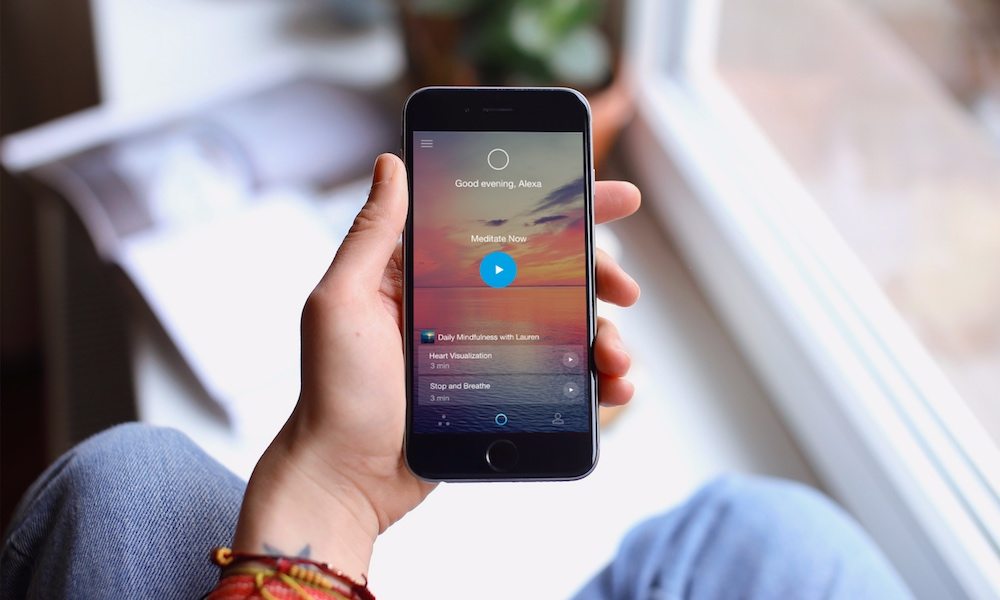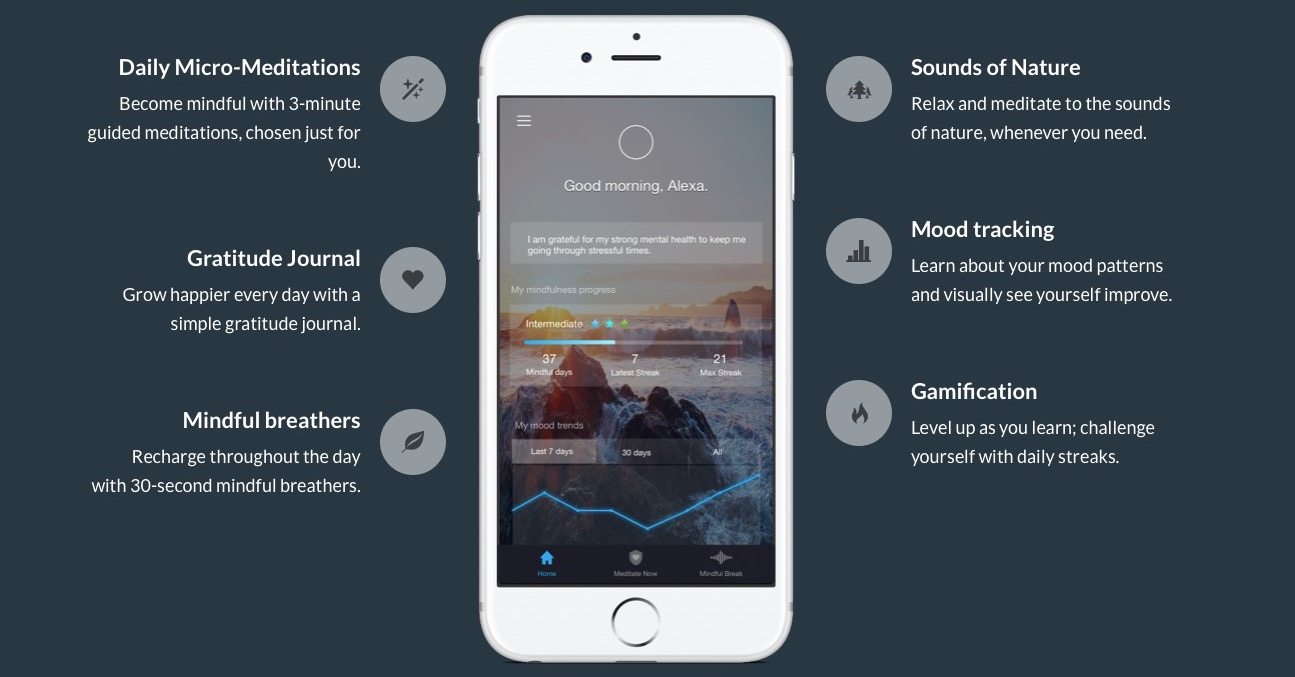How Your iPhone Can Help You Alleviate Stress and Anxiety

Toggle Dark Mode
Technological advancements have made it possible for us to do more than we ever thought possible. We’ve even started to turn to technology to alleviate our stress with meditation apps like Aura — practices typically reserved for peaceful, technology-less spaces. So why the sudden need for structured de-stressing?
If you think about the average day spent in an office environment, technology can cause more stress than it alleviates. It’s pretty common to use a task manager to help control your workflow, plus email and chat for communication with colleagues, a video conferencing solution for remote meetings with partners and clients, plus a whole host of other tools that makes it possible to work on cross-functional teams, across departments, across state lines and even oceans. We even see a flux of technology emerging to help us with common tasks around the house — we can order household items instead of going to the store, even set up our homes to run without us. A Jetsons-style future where we automate lights turning on and off, or set up sprinklers to shut down automatically or even set up alarms and lights for when you sleep and wake up — that’s all possible now.
But sometimes the ability to multitask ends up causing more stress, as opposed to helping create more time. The culprit could be the nature of multitasking itself: studies show that only 2% of the population are genetically predisposed to succeed at multitasking. And the way we’ve been using technology to flit around from task to task could be killing our IQ, lowering our ability to process information and causing our cognition and response time to be far more delayed.
Even worse, from a social perspective, it’s become common to accept our stress as trivial, or just the result of an unavoidable, unchangeable status quo. But the effect of stress on the body can be devastating — here are just a few physical issues that could manifest:
Physical Issues Caused By Stress
Muscle tension
Feeling achy, sore, full of bodily pains? You’re not the only one. Your stress could be causing the tension you feel in your limbs and muscles. It’s oddly your body’s way of guarding against pain — think of the way you instinctively brace your muscles against impact when you’re about to fall. The difference is that’s an adrenaline-fueled moment — versus a constant state of being.
Respiratory issues
Stress can cause troubled breathing or rapid breathing, neither of which is healthy for you and kicks your body into high gear — breathing is actually a somatic trigger. Like a snowball rolling down a hill, it’s one of the physical symptoms that manifests and leads to the other issues we list.
Cardiovascular strain
Pretty much everyone can agree: it’s important to keep your heart healthy. Stress causes this essential organ unnecessary duress, increasing your heart rate and leading to elevated blood pressure.
Gastrointestinal problems
Ever been so nervous for a presentation, or excited for a big day, that your gut starts to be a problem? Stress-induced acid reflux is never fun to deal with — neither are general digestive issues, like nausea or pain.
How Meditation Can Help
If you thought that meditation is something that exists mainly inside the walls of a yoga studio, you’d be wrong. Meditation has been practiced for centuries by people all over the world and has been scientifically-studied for the positive effect it has in reducing blood pressure, symptoms of irritable bowel syndrome, anxiety and depression, and insomnia, just to name a few things.
So, what is meditation exactly? At its heart, meditation is a mind and body practice that focuses on integrating and noting the dynamic responses/reactions between the physical brain, the thinking mind, the body and one’s behavior. Otherwise, the actual practice of meditation can be extremely varied — but a practice shares these common traits:
- It’s a quiet practice: as few distractions as possible, even if that’s just you ignoring your dog, the delivery guy or that phone call for just three minutes.
- One specific, comfortable posture: whether that’s seated, lying down, walking or otherwise — you choose a stance/action, and you don’t waver from that.
- A focus of attention: a word, an object, the sensation of the body — these can be varied in nature.
- An open and accepting attitude: acknowledging that distractions might come and go (external or internal), and letting them pass with grace before returning to the point of focus.
So why does meditation, in its essence one of the most approachable mindfulness practices out there, have a bad rap? Lots of folks have misconceptions about the practice of meditation: either it takes too long, it has no practical benefits or that the location needs to be ideal.
These misgivings are totally contrary to the heart of meditation. No situation in life ends up being perfect — and meditation helps carve out a mental pathway to being less reactive and agitated by external factors, promoting a sense of acceptance and also agility. From a business/office environment standpoint, it’s the equivalent of taking a breath to pause, assess objectively and then problem solve. And aside from the physical benefits mentioned, meditation has these cognitive benefits:
- Improves concentration
- Increases self-awareness
- Promotes happiness
- Slows down aging
Not to mention, meditation helps you relax — and in scientific terms, that increases the compound nitric oxide that causes blood vessels to open up and reduces blood pressure.
Use Your iPhone to Start a Meditation Practice
So, coming full circle — how do we break the revolving door, and befriend the same devices and tools that were starting to drive us (literally) crazy? Download a meditation app like Aura to your iPhone — and make your iPhone the driver of a healthy, consistent meditation practice.

Aura is already a smash on the App Store: in fact, it’s received a 5/5 star rating on iTunes, based on more than 3,300 reviews. That’s a lot of users backing up the way the app was developed (by some of the top meditation teachers and therapists around), and the effectiveness of its exercises, which are all highly customized per user based using groundbreaking AI.
Aura is:
Easy to use
There’s nothing too overwhelming or esoteric, especially for beginners. There are even three-minute guided meditations available, perfect for people juggling a lot in their day.
Able to track progress
You can monitor and track your mood over time, noting how much more effective and relevant the mindfulness exercises got over an extended period.
Tailored for you
Aura’s AI feature helps you find the most beneficial meditation program — meaning there’s absolutely no way you get a cookie-cutter approach. The app asks you for feedback consistently to help steer your way to a more mindful, less-stressed state.
Make 2018 the year you prioritize your mental health: get the lifetime subscription here for $59.99, or 84% off the usual price.






